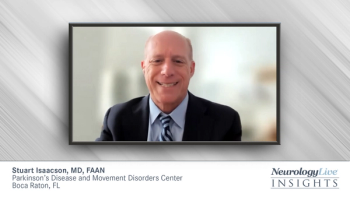
Expert neurologist reviews manifestations of OFF episodes and their impact on the quality of life of patients with Parkinson’s Disease.

Expert neurologist reviews manifestations of OFF episodes and their impact on the quality of life of patients with Parkinson’s Disease.

Stuart Isaacson, MD, FAAN, defines the terminology of OFF episodes in Parkinson’s disease and what “OFF” means from a clinical perspective.

The associate professor of neurology at Columbia University and medical consultant and care center director for MDA offered his insight into the latest progress in ALS treatment and some of what will be discussed at the upcoming MDA Clinical & Scientific Conference.

The senior vice president and chief scientific officer of the Parkinson’s Foundation discussed the potential for new therapies that target genetically mutated forms of Parkinson disease. [WATCH TIME: 3 minutes]
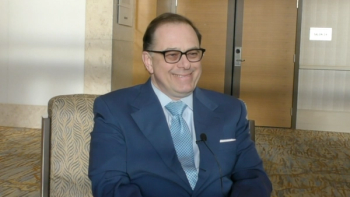
The clinical research director of the UCSF Multiple Sclerosis Center spoke about the barriers in accessing proven therapies for NMOSD at the 2023 ACTRIMS Forum. [WATCH TIME: 3 minutes]
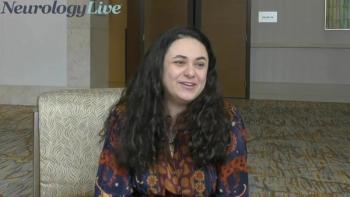
The associate director of the Multiple Sclerosis & Neuromyelitis Optica Unit at Massachusetts General Hospital discussed the ways employers and clinicians can alleviate work hardships experienced by patients with NMOSD. [WATCH TIME: 3 minutes]
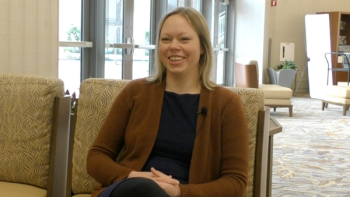
The clinical assistant professor of neurology at Jacobs School of Medicine and Biomedical Sciences, University at Buffalo, New York, talked about her presentation on Evusheld at the 2023 ACTRIMS Forum. [WATCH TIME: 5 minutes]

The senior vice president and chief scientific officer of the Parkinson’s Foundation detailed some of the potential reasons for the nearly 50% increase from the previously estimated rate. [WATCH TIME: 5 minutes]
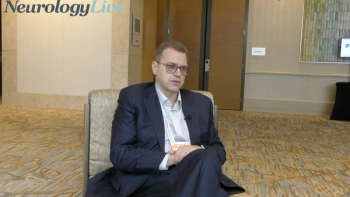
The director of the Buffalo Neuroimaging Analysis Center provide perspective on innovative ways to monitor progression in multiple sclerosis, and the importance of high-level care facilities. [WATCH TIME: 5 minutes]

At the 2023 ACTRIMS Forum, the clinical research director of the UCSF Multiple Sclerosis Center talked about the implications for patients on B-cell depleting therapies infected with COVID-19. [WATCH TIME: 4 minutes]
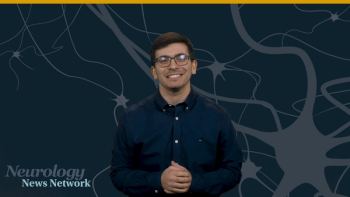
Neurology News Network for the week ending March 4, 2023. [WATCH TIME: 3 minutes]
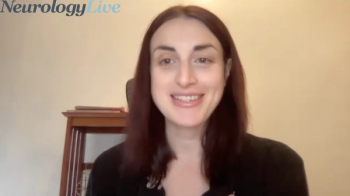
The executive director of the Alliance for Headache Disorders Advocacy delved into the critical access and policy issues expressed at the 2023 Headache on the Hill. [WATCH TIME: 7 minutes]

The clinical research director of the UCSF Multiple Sclerosis Center spoke on the findings from two post-hoc analyses that were presented at the 2023 ACTRIMS Conference. [WATCH TIME: 3 minutes]
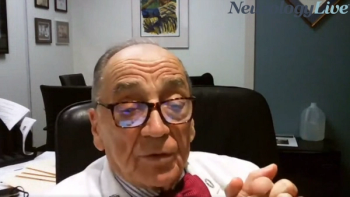
The director of the Ann Kimball & John W. Johnson Center for Cellular Therapeutics at Houston Methodist provided insight on previously approved therapies for ALS, and whether they can work synergistically with agents that enhance regulatory T cells function. [WATCH TIME: 5 minutes]
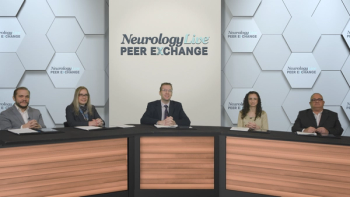
The expert panel shares clinical pearls for treatment and management of Spinal Muscular Atrophy. O painel de especialistas compartilha recomendações valiosas para o tratamento e manejo da atrofia muscular espinhal.

Dr Marcelo Kerstenetzky highlights areas of unmet needs in rare diseases education for healthcare professionals in Brazil. Dr Marcelo Kerstenetzky ressalta áreas de carência na educação sobre doenças raras para profissionais de saúde no Brasil.

The expert panel shares recommendations and advice for care teams and families of patients with spinal muscular atrophy. O painel de especialistas compartilha recomendações e conselhos para equipes de saúde e familiares de pacientes com atrofia muscular espinhal.
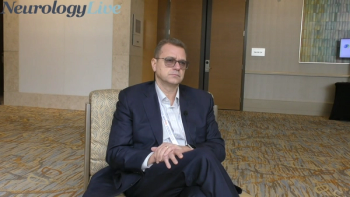
The director of the Buffalo Neuroimaging Analysis Center discussed the need to further explain differences in cortical lesions and deep gray matter in patients with severely affected multiple sclerosis. [WATCH TIME: 4 minutes]
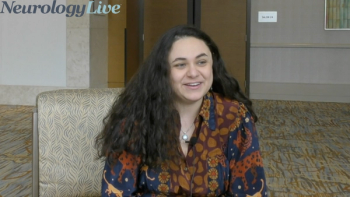
The associate director of the Multiple Sclerosis & Neuromyelitis Optica Unit at Massachusetts General Hospital provided perspective on a study that linked NMOSD to increased unemployment and decreased income. [WATCH TIME: 6 minutes]
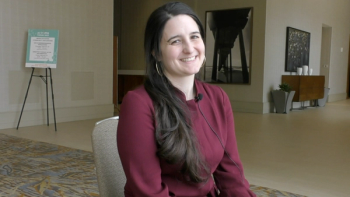
The staff neurologist from the Mellen Center for MS Treatment and Research at the Cleveland Clinic discussed how patients with multiple sclerosis are more open to using telehealth for accessing their healthcare providers at the 2023 ACTRIMS Forum. [WATCH TIME: 4 minutes]
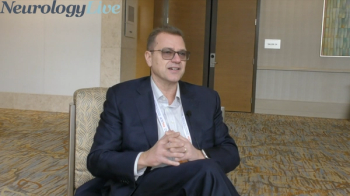
The director of the Buffalo Neuroimaging Analysis Center provided context on the CASA-MS study, and the key differences in why certain patients with multiple sclerosis experience more rapid disability progression. [WATCH TIME: 4 minutes]

Episode 31 of the AUPN Leadership Minute features Donald S. Higgins, Jr., MD, of the VHA and Albany Medical College; and Adam Newsom, of Merritt Hawkins. [WATCH TIME: 5 minutes]
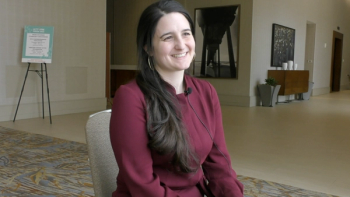
At the 2023 ACTRIMS Forum, the staff neurologist from the Mellen Center for MS Treatment and Research at the Cleveland Clinic talked about the lack of trust and engaging more with the MS community. [WATCH TIME: 5 minutes]
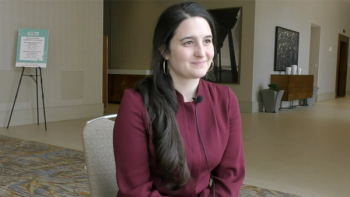
The staff neurologist at the Mellen Center for MS Treatment and Research at Cleveland Clinic, spoke at the 2023 ACTRIMS Forum about disparities in care access for patients with MS. [WATCH TIME: 5 minutes]
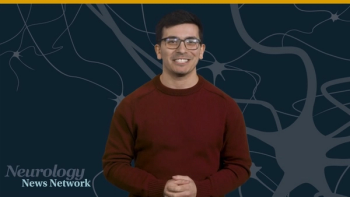
Neurology News Network for the week ending February 26, 2022. [WATCH TIME: 3 minutes]
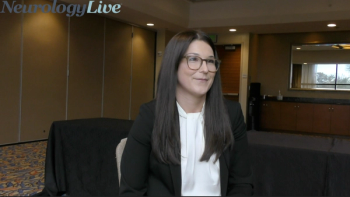
The multiple sclerosis fellow at Michigan Institute for Neurologic Disorders provided perspective on the clinical utility and advantages of a multi-protein test that assesses multiple sclerosis disease activity. [WATCH TIME: 3 minutes]
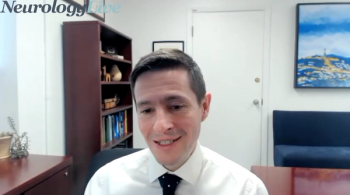
The program committee vice-chair of ACTRIMS discussed the continued efforts to understand inflammation and neurodegeneration of multiple sclerosis. [WATCH TIME: 3 minutes]

Drs Juliana Gurgel Giannetti, Rodrigo de Holanda Mendonça and Marcelo Kerstenetzky examine barriers to participation in clinical trials in Brazil for patients with spinal muscular atrophy. Drs Juliana Gurgel Giannetti, Rodrigo de Holanda Mendonça e Marcelo Kerstenetzky analisam barreiras para a participação de pacientes com atrofia muscular espinhal em testes clínicos no Brasil.

The expert panel discusses challenges in clinical monitoring and access to care for patients with spinal muscular atrophy in Brazil. O painel de especialistas discute desafios no monitoramento clínico e no acesso a atendimento de saúde para pacientes com atrofia muscular espinhal.
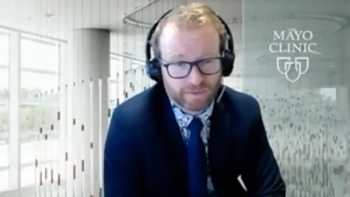
The neurologist at Mayo Clinic in Jacksonville Florida talked about the significance of the ExTINGUISH trial, regarding care for patients with autoimmune encephalitis. [WATCH TIME: 4 minutes]